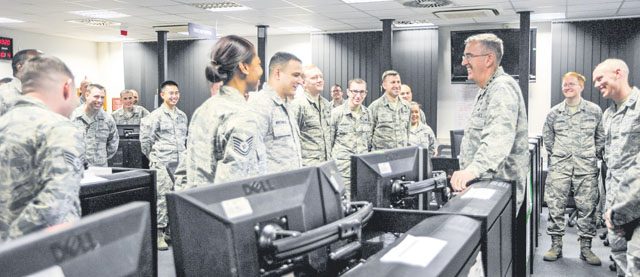
War used to be fought solely with tanks and airplanes, but in an age of technology, some would argue the keyboard is mightier than the sword.
Team Ramstein cyberspace warriors at the 691st Cyberspace Operations Squadron ensure cyberspace is a viable domain to complete the Air Force mission.
“Cyber plays an important role in every Air Force mission,” said Maj. Michael J. Hurley, 691 COS commander. “All of our mission and support systems rely on the confidentiality, availability and integrity of our networks.”
The Airmen assigned to the 691 COS guarantee their networks remain reliable.
According to Hurley, the primary domains people consider when talking about warfighting are land, sea, air, and space. However, with the addition of cyberspace — a manmade domain — new challenges arose.
“How important is cyberspace?” asked Chief Master Sgt. Brendan Criswell, command chief of Air Force Space Command. “It’s an equalizer for our adversaries. No one is throwing up rockets to compete with us, but any person with a computer and the will could be a potential threat.”
To counter such threats, the 691 COS was activated in March 2016 after the 83rd Network Operations Squadron Detachment 4, and the 690th Network Support Squadron Detachment 1 were combined to focus their cyberspace warriors on a more operational mission.
Through the merger, the 691 COS is better able to allow commanders to prioritize their assets’ cyber mission requirements. In the case assets need to be protected from threats, the 691 COS can provide a mechanism and concept of operations to protect more valuable assets.
“From a defensive end, we ensure those key components within the internal boundary of the Air Force Network, or the AFNet, are protected,” Hurley said. “We scan for vulnerabilities and viruses as well as patch and maintain equipment to secure it so that we don’t have malicious code and spear phishing emails causing harm.”
The 691 COS accomplishes this for their global customers by focusing on four of the six 24th Air Force lines of effort for the Cyberspace Security Control System: build, operate, secure and defend.
The build LOE ensures the Air Force Information Network is established and sustained to enable agile and responsive cyberspace superiority.
The operate LOE comprises of actions taken to ensure the AFIN portion of the Department of Defense Information Network is functional and operational.
The secure LOE prioritizes actions to prevent adversaries from achieving effects and to establish an acceptable level of information confidentiality.
The defend LOE addresses protecting key cyber terrain from adversaries. It includes outmaneuvering or prohibiting adversaries taking action against defended networks or responding to imminent internal and external cyberspace threats.
“Cyber threats continue to grow in scope, intensity and sophistication,” Hurley said. “In no other period in history have we seen threats increase with such speed, pace and proliferation. Time is our nemesis, and we cannot afford to stand in this complex, contested and manmade domain.”
During his visit to the 691 COS, General John E. Hyten, AFSPC commander, agreed that time is something they can’t waste.
“It took us 25 years to make space real in the Air Force,” Hyten said. “It cannot take us 25 years to make cyberspace real. We just don’t have that time.”
Hyten mentioned that cyberspace and the connected technology grow too fast to spend that much time to make cyberspace a priority. He also asked the members of the 691 COS to remember why their jobs are important when looking to future changes.
“Changes are coming, and it all comes down to the ‘why,’” Hyten said.
One change that has already taken place because of the ‘why’ is the 691 COS itself.
Before the merger, the two detachments operated more as service desks responding to customers’ tickets. Now, they get to act more on what Hyten believes is their real business — protecting key mission systems and saving lives.
The 691 COS not only protects and collects information, but they also create cyber effects that hinder adversaries and aid allies before a tank or plane is even moved, effectively removing or minimizing threats.
“The ‘why’ is so much more important than the ‘what’ and the ‘how,’” Hyten said. “The ‘why’ means everything, and I hope like me, every time you realize the ‘why,’ you realize we’ve changed warfare.”


